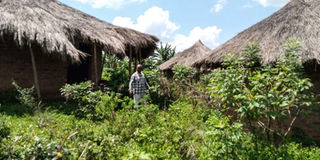Residents decry poor state of Bamasaba cultural site

The abandoned Mutoto cultural site in Mbale City. PHOTO/MICHEAL WONIALA.
What you need to know:
- The shrines, which shelter our gods, who give us rainfall, blessings and prosperity, have been abandoned. This is an abomination,” Philip Watundu, elder.
- The current state of the shrines is a total disrespect to the Bamasaba and their culture at large,” John Wasike, a resident of Lutsekhe in Bududa.
- Those shrines are the fulcrum of our customs. They are in the current shape just because of the disruptions caused by coronavirus,” Moses Kutosi, chairperson, Imbalu in Inzu- Ya- Masaaba.
Residents in Bugisu Sub-region have accused the leadership of Bamasaba Cultural Institution, the Inzu- Ya-Masaba, of failure to maintain the sacred shrines at Mutoto Cultural Grounds in Mbale City.
The site, which is believed to be the place where the first Mugisu (Mumasaba) was circumcised, harbours several grass-thatched shrines with cultural significance.
When Daily Monitor visited the area on Tuesday, we found out that the huts are on the verge of collapse.
Inside the shrines, there are signs of faecal matter. The huts also leak whenever it rains.
Among the shrines include one which belongs to Masaaba, who is said to be the first Mugisu.
Masaaba’s shrine is surrounded by three other shrines belonging to his three children, namely, Mwambu, Mubuuya and Wanaale.
When there is a cultural ceremony such as the launch of imbalu (circumcision), rituals are performed in the shrines to appease the gods before the ceremony proceeds.
After appeasing the gods, the reigning cultural leader emerges from Masaaba’s shrine, which is at the centre and the biggest, to the arena accompanied by few elders as his subjects cheer on.
Mr Philip Watundu, an elder who lives a few metres away from the cultural site, said it’s unfortunate that the shrines, which shelter their gods, have been neglected.
At the site, there are other incomplete shrines surrounded by overgrown shrubs, belonging to the respective 26 clans among the Bamasaba.
The Bamasaba hail from the districts of Mbale, Sironko, Manafwa, Bududa, Bulambuli, Namisindwa and some parts of Kenya.
Mr John Werikhe, another elder, blamed the mess on the outgoing leadership led by Mr Bob Mushikori, saying they spent the five-year term fighting instead of building the institution.
“Our outgoing cultural leader was misled from the start by a section of wrong elements. The five years have been painful years,” he said.
Mr Mushikori, whose term of office has expired, is supposed to leave office to the newly installed cultural leader, Mr Jude Mike Mudoma, a research scientist, who formerly worked with National Agricultural Research Organisation (Naro). Mr Mudoma is from Buyobo clan in the family of Mwambu.
Mr John Wasike, a resident of Lutsekhe Sub-county in Bududa, said they have raised their concern on the collapsing shrines but authorities are not bothered.
Mr Fred Mutambo, a resident of Bungokho Mutoto Sub-county in Mbale City, said the institution leadership only maintains the shrines towards the launch of imbalu.
Mr Moses Kutosi, the chairperson of Imbalu in Inzu- Ya- Masaaba, acknowledged that the shrines are in poor state, but said the institution reneged on its responsibility partly due to disruptions caused by coronavirus.
Mr Kutosi said the new cultural leader has plans to ensure routine maintenance of the shrines and also build a museum in order to promote imbalu as a tourism attraction.
The newly installed Umukukha Mudoma, when contacted, said during his reign, he will ensure the site is developed with a modern library.
“We need a library where people can go to immerse themselves in knowledge about our culture, traditions and norms,” he said.
The Bamasaba Cultural Institution conducts rotational leadership among three families of Mwambu, Mubuya, Wanaale and Babukusu of Kenya (Bamasaba of Kenya). The descendants of Mwambu live in Sironko and Bulambuli districts, Mubuya (Manafwa, Bududa and Namisindwa) and Wanale in Mbale.
The first cultural leader, Mr Wilson Wamimbi, who was elected in 2010, came from the family of Wanale and Mr Mushikori is from the family of Mubuya. Mr Mushikori was elected in 2015.




